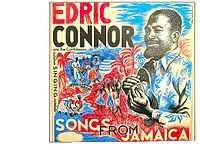Edric Connor

Edric Connor (2 August 1913–13 October 1968) was a pioneering Caribbean singer, folklorist and actor who was born in Trinidad. He was one of the trailblazers of the calypso genre in the United Kingdom, where he migrated in 1944 and chiefly lived and worked until his death from ancylostomiasis in Putney, London, at the age of 55.
Career
Edric Esclus Connor[1] was born in 1913 in Mayaro, Trinidad. He settled in England in 1944, making his debut on BBC radio two weeks later, in Calling the West Indies.[2] In 1951 he was responsible for bringing the Trinidad All Steel Percussion Orchestra - TASPO - to the Festival of Britain.[3] In 1955, he recorded the first Manchester United Football Club song, "The Manchester United Calypso", FTB Pro.[4] That same year, he and his wife Pearl, whom he had married in 1948,[2] set up the Edric Connor Agency, representing black actors, dancers, writers and musicians, which later, in the 1970s, she ran under the name of the Afro-Asian-Caribbean Agency.[5] In 1963 they set up the Negro Theatre Workshop, one of the UK's first black theatre groups.[6]
Connor appeared on stage in Summer Song at London's Princess Theatre in 1956. In 1958 he became the first black actor to perform for the Royal Shakespeare Company in Stratford, playing Gower in Pericles, having been rrecommended for the role by Paul Robeson.[2] Connor acted in a total of 18 films and was best noted for his role as Daggoo in Moby Dick.
Connor also co-starred with Rita Hayworth, Robert Mitchum, and Jack Lemmon in the 1957 film Fire Down Below, directed by Robert Parrish, playing the character Jimmy Jean, who was the third man on the "boat-for-hire" along with Mitchum and Lemmon.
In 1952, with his band "The Caribbeans" (subsequently called The Southlanders)[7] Connor recorded a "groundbreaking LP of Jamaican folk music" entitled Songs from Jamaica.[8] This included the song "Day Dah Light", which portrayed the hard life of Caribbean field workers. The song was later recorded by Jamaican folk singer Louise Bennett in 1954, and was later rewritten by Irving Burgie and William Attaway in 1955. The version performed by legendary singer Harry Belafonte became popularly known as "Day-O (The Banana Boat Song)", reaching number five on the Billboard charts in 1957, and was even featured in the popular film directed by Tim Burton, Beetlejuice, in 1988.
Connor's acting for television included roles in the espionage series Danger Man: as the character Thompson in "Deadline" (1962, the final episode of the first series, which unusually featured an almost all-black cast), and memorably as opposition leader Dr Manudu in the series 2 episode entitled "The Galloping Major" (first aired on 3 November 1964).
Legacy
His daughter Geraldine Connor (1952–2011) - herself a singer and ethnomusicologist - was instrumental in bringing to light her father's autobiography, Horizons: The Life and Times of Edric Connor 1913-1968, which was written in the mid-1960s and only finally published in 2006. In 2005, Geraldine accepted an award on behalf of the Connor family from the British Association of Steelbands, in celebration of her family’s contribution to the Promotion of Steelband Music, Caribbean Art, Culture and Heritage throughout the United Kingdom.[9] The Edric and Pearl Connor Papers, 1941-1978,[10] were donated to the Alma Jordan Library at the University of the West Indies, St Augustine, Trinidad & Tobago, and additional material on them is housed in the Schomburg Center for Research in Black Culture.
A prestigious annual award named after him, the Edric Connor Inspiration Award, is made annually in his honour in the Screen Nation Film & TV Awards. It was won in 2011 by Sir Trevor MacDonald OBE, other previous winners including Moira Stuart (2007), Mona Hammond (2006) and Lenny Henry (2002). His name is also associated with the "Edric Connor Trailblazer Award", of which a notable winner in 2003 was Rudolph Walker (who, coincidentally, in 1989, like Connor before him also played Gower in Shakespeare's Pericles).
Selected filmography
- Cry, the Beloved Country (1951)
- West of Zanzibar (1954)
- Moby Dick (1956)
- Fire Down Below (1957) with Rita Hayworth, Robert Mitchum, and Jack Lemmon
- Virgin Island (1958)
- The Vikings (1958)
- The Roots of Heaven (1958)
- Only When I Larf (1968)
Selected discography
Edric Connor and The Caribbeans
- Songs From Jamaica (Argo Records, 1954)
Edric Connor and The Southlanders
- Songs from Trinidad (Argo, 1955)
- Calypso (1955)
Edric Connor with Ken Jones And His Music
- "Manchester United Calypso" / "Yorumba Highlife" (Oriole, 1957)
Bibliography
- The Edric Connor Collection of West Indian Spiritual and Folk Tunes, arranged for voice and piano, Boosey & Hawkes, 1945.[7]
- Horizons: The Life and Times of Edric Connor 1913-1968, an autobiography; with foreword by George Lamming and introduction by Bridget Brereton and Gordon Rohlehr (Kingston, Jamaica: Ian Randle Publishers, 2007).
Further reading
- Stephen Bourne, Black in the British Frame: The Black Experience in British Film and Television, Continuum International Publishing, revised 2nd edition 2001.
References
- ↑ Stephen Bourne, "Mogotsi, Pearl Cynthia Connor- (1924–2005)", Oxford Dictionary of National Biography, Oxford University Press, 2009.
- ↑ 2.0 2.1 2.2 "Connor, Edric (1913-1968), in David Dabydeen, John Gilmore and Cecily Jones (eds), Oxford Companion to Black British History, Oxford University Press, 2007, pp. 113-14.
- ↑ Notes, "(1954) Edric Connor & The Caribbeans – Songs from Jamaica", folkcatalogue.
- ↑ Davy Collins, "A history of the chants", 17 August 2012.
- ↑ The Guardian, obituary of Pearl Connor-Mogotsi by Margaret Busby.
- ↑ BBC 1Xtra Black History timeline
- ↑ 7.0 7.1 Notes, "(1955) Edric Connor and the Southlanders – Songs from Trinidad", folkcatalogue.
- ↑ "Edric Connor" Artist Biography by Bruce Eder. AllMusic.
- ↑ Margaret Busby, Geraldine Connor obituary, The Guardian, 31 October 2011.
- ↑ Edric and Pearl Connor Papers, 1941-1978, University of the West Indies, Special Collections, Alma Jordan Library.
External links
|